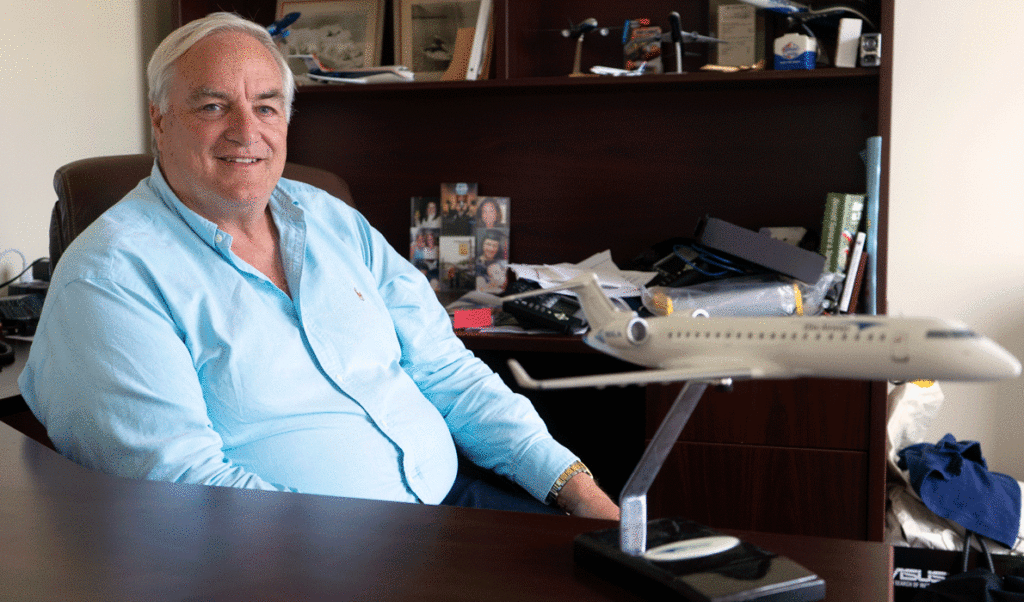According to the Federal Aviation Administration, 2.5 million people fly in and out of U.S. airports each day. Though the airline industry is dominated by large companies, a clever entrepreneur can find a niche to serve within that volume of passengers.
John Pearsall is that clever entrepreneur.
Pearsall owns and operates Elite Airways, based in an office on a pier in Portland. Pearsall, a native of New Jersey who now lives on Long Island in Casco Bay, found his niche with college sports teams.
Elite Airways now operates 15 aircraft, with plans to add another five, and employs 180 people at various locations. About 25 work in Portland, including dispatchers, maintenance controllers, and management staff. The airline transports NCAA basketball, lacrosse, track, soccer, baseball, and softball teams to and from collegiate competitions around the U.S., which accounts for about 85 percent of its business.
Elite also has worked with NHL and Major League Baseball teams and popular musical acts. Pearsall, who was relaxed and low-key in an interview, despite getting frequent texts on his phone, joked that the fictional band Spinal Tap also booked the airline.
Elite also provides year-round scheduled flights from Portland, Maine to Sarasota, Melbourne, and Key West, Florida in addition to other charters.
In all, the company has annual revenue of approximately $30 million, Pearsall said.
Aircraft, mechanics, flight attendants, and nearly 60 pilots are strategically located around the U.S.
“We fly them to where they need to be,” he said.
As well-established and well-run as Elite Airways seems, Pearsall paid some dues in getting his wings. He began flying as a teen, soloing at age 16, and then at 18, worked as a pilot for a company that delivered checks, often flying alone through the night.
Pearsall completed a degree in electrical engineering and then, in the late 1970s, he began working as a pilot-engineer with Lockheed in Saudi Arabia, flying with that country’s Ministry of Defense. A pilot job in the Middle East with oil giant Mobil followed which took him worldwide.
Returning to the U.S., he leveraged his experience working in flight departments of large companies to join American West Airlines. Following that, he was part of the startup team that launched National Airlines in Las Vegas a 18 aircraft Boeing 757 scheduled air carrier.
“We got that going, and that did really well. Except, we had 9/11.” The terrorist attacks dampened air passenger business and raised aircraft fuel process.
“The revenue dried up,” he said. “It was tough, but being part of this start-up was an invaluable experience.”
In 2006, Pearsall decided to try another solo effort—his own airline. His checklist included knowing the aircraft and knowing the VIP charter business.
With his wife from Portland, and a good personal relationship with FAA officials at the jetport, he decided the city would be a good home. In 2007, Elite began operating from Portland. Now, its staff of 180 is poised to grow to 220. Elite plans to add five more aircraft to the fleet of 15.
The 50- and 70-seat aircraft the company now uses, with two seats on either side of a center aisle, are ideal for the company’s focus. The business plan became serving the sports world. First, it was NASCAR customers, then colleges. The schools seek bids for carrying student athletes to competition for an entire season, and during tournaments, the NCAA contracts with Elite.
“We could really concentrate on sports charter,” he said of the strategy, aiming for “slow, measured growth. I think we’ve been very conservative and smart.”
Elite began by leasing its aircraft, but is now purchasing. The next step is to begin using 757s, with which Pearsall is familiar from past work. In commercial use, the planes can carry 240 passengers, but outfitted for charter, they have 86 first class seats.
“We love being here in Portland,” he said. “We plan to stay in Portland.” Pearsall plans to extend the fleet’s maintenance operation to Lewiston-Auburn this fall bringing additional jobs to the city. The local business community has been supportive, he said, and enjoys the small-town nature of the city.
And the commute to work via a ferry and then a short walk to a pier isn’t bad, either, he says.





